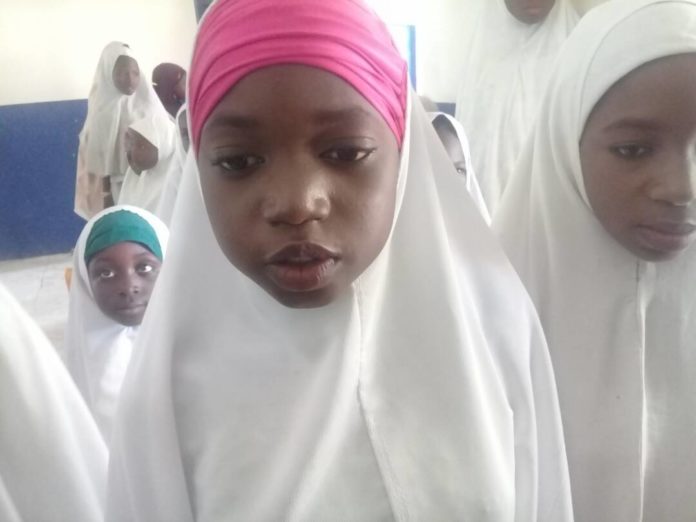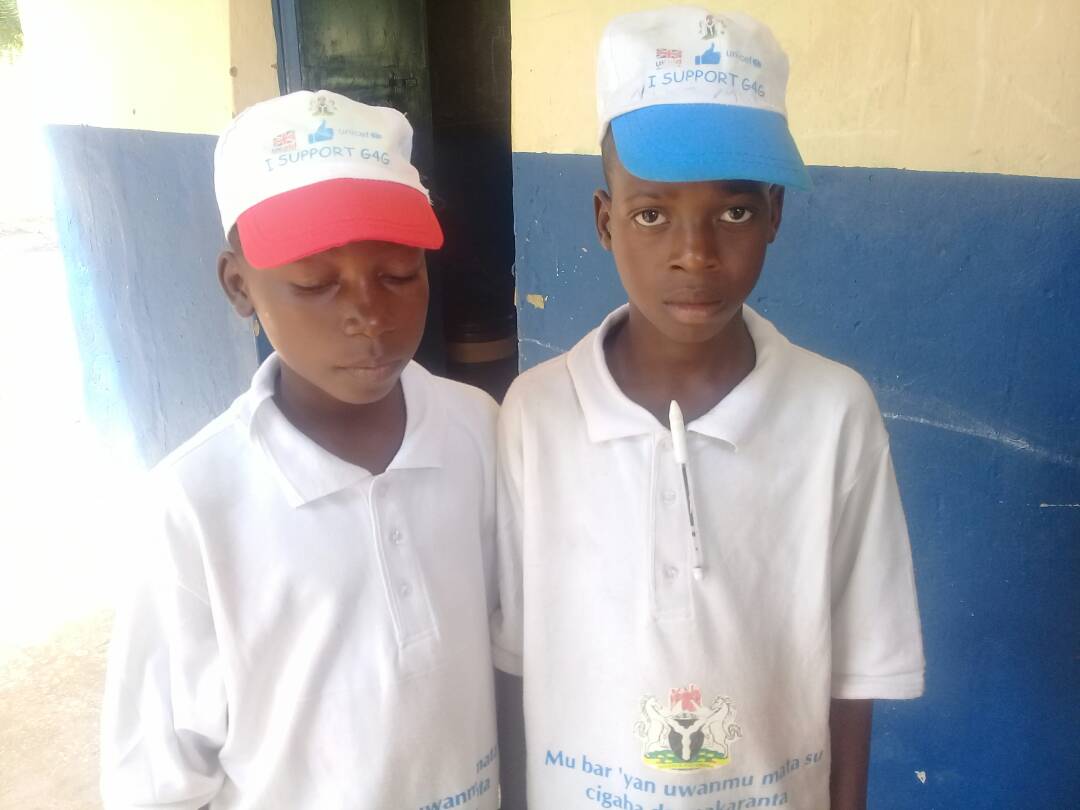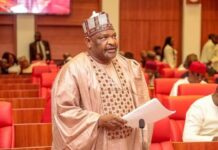
by NdidiChukwu Odoh
Gurubi Model Primary School in Talata Mafara has witnessed more girls enrolling in school in the last six months. Waking up to go to school for girls like Aisha Mustapha, 13, now feels different and better.
“Before I hate coming to school, because I sleep and my teacher doesn’t like it,” she recalls.
Aisha had a challenge coping with early morning domestic chores, coming to school and going home after school to sell groundnuts to support her family.
For Aisha the best option and easier thing to do was to go to school twice a week and hawk groundnuts to support her mother the rest of the week.
“Things are different now,” she says. “My friend in school is also my neighbour. His name is Ibrahim Abubakar. He supports me with my chores in the morning so I’m able to go to school early and every week,” she adds with a smile on her face.
Aisha has four younger siblings who are not in school yet. As the older child of her parents, she wants her younger ones to learn and love education.
She has come to understand that she can have a better future if she is educated. “I want to be a lawyer, I am happy I can now come to school every day and learn with other children,” she says.
Aisha narrated how she is supported and mentored through United Nations Children’s Fund (UNICEF)-introduced Girls for Girls (G4G) project, to learn vocational skills. She chose bead making. “Bead making is better than selling groundnuts. I make more gains and I have to go to school every day,” she says.
“I love G4G. It has improved me in several ways. My life has improved in terms of hygiene, I have become more responsible, obedient to my parents and I have learnt so much about life that will help me in the future and even giving back to my community.”
In Zamfara State, parents and communities have improved knowledge and commitment to contribute to enrolling their female children in quality learning, safe and protective school environments.
This is in support of the efforts to promote the enrolment and retention of girls in school in the region through Girls for Girls and He for She project introduced by UNICEF.
G4G is a school-based safe space, extra curriculum activity, created for girls to increase demand and support for girls education and their retention in school.
G4G also enhances self appreciation and self esteem for girls as well as improves their transition from lower to upper levels of education.

Aisha wants all girls in her community to enrol in school instead of going hawking. The G4G project has helped her to grow her self confidence and she wants other girls in her community to also come to school to learn.
While the G4G is meant for girls, a new strategy, the “He4She” trains boys and male champions to build support for girls.
Young boys, like 14-year-old Ibrahim Abubarkar and Abdulraman Al-muazu, 13, are such mentors. They are trained to support girls education and retention in school.
In Mafara community like any other community in sub-Saharan Africa, domestic chores are for girls. They wake earlier than boys to sweep the house and surrounds, cook breakfast, fetch water before going to school in the morning while boys in the families wake up later to eat breakfast and run to school.
Ibrahim who lives beside Aisha and a He4She member supports Aisha with her chores. He wakes up early to sweep their compound together while Aisha prepares breakfast for the family. After school both children fetch water to be used the next day by both families.
“I am happy I can help Aisha with her chores now she comes to school early and no longer sleeps in class. We study together. Now most of the friends in the class are now my friends,” Ibrahim said.
Ibrahim says, “It is good that girls are encouraged to go to school. I want to be a pilot and marry a medical doctor.”
His aspiration, according to him, will be achieved when girls like Aisha are supported to come to school and not sell groundnuts when they are supposed to be in school.
G4G creates space for girls to work in groups, initiate and lead a range of activities to identify barriers to the education of girls in their communities and contribute solutions to the problems that deny girls the opportunity to enrol and remain in school. He4She teaches boys how to support and promote girl education for equal opportunity.
According to Tayo Fatinikun, executive director of Life Helpers Initiative and local implementing partner of UNICEF/UKAID G4G, the G4G and He4She initiatives allow regular interface with all stakeholders including the girls to understand their challenges and poor interest to be in school after which a high level advocacy for positive government programs or policy towards girls education will be organized in the state.
“Established in 100 selected schools the local government area of Anka, Talata Mafara, Shinkafi, Kaura Namoda, Bugudu and Tsafe, issues of child protection are being highlighted and girl’s abuses are spotlighted through the programme,” said Fatinikun.
“G4G focuses on developing their interest in education, life skills and health. Each school has three mentors comprising of female teachers where available and members of “mothers’ association”. Mothers through the women groups are now more interested in enrolling their girls in schools than sending them to sell and make money for the family.
“From our work with the women in the communities they are now more interested in taking their girls to school because while in school the girls also learn other skills, like bead making, how to use groundnuts to produce oil and sell them. The girls are also taught everything they need to know about sanitation and hygiene, this helps them during their menstrual periods as well. So G4G is a win-win for all, we have the girls in school, they have skills they can use to make money and also their health is protected through education on sanitation and hygiene”, said Halima Ibrahim Maigani, a member of High Level Women Advocates.
According to Azuka Menkiti, UNICEF’s Education Specialist, G4G intervention is to contribute to the retention goal of UNICEF’s Girls Education Program Phase 3, by supporting girls’ enrolled in GEP3 schools to stay in school and complete primary education.
“We work with girls to improve support and mentoring in schools, for girls and by girls, and thereby improve girls’ retention and learning in schools. It also empowers girls to appreciate who they are, and why they should remain in school and encourages them to remain and complete education and aspire to higher levels.”
So far, more than 15,000 girls from Bauchi , Katsina and Zamfara are enrolled and participating in 813 established G4G groups across 18 LGAs in the 300 pilot schools in the three states.
The G4G has shown that “structured sensitization of stakeholders and consultation processes are worth the time and effort invested in them when introducing new initiatives, as they enhanced wider understanding of the value of the G4G intervention and subsequent buy-in of the initiative,” Menkiti said.
























